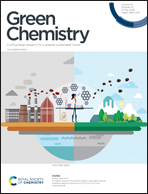Effects of water in the heterogeneous catalytic valorization of levulinic acid into γ-valerolactone and its derivatives
Abstract
Levulinic acid (LA), which is considered a versatile biomass-derived molecular platform, typically occupies a core position in the cellulosic biorefinery system. The heterogeneous catalytic valorization of LA for the synthesis of various value-added chemicals and biofuels has been extensively investigated over the past decade, in which the solvent strategy has been reported to exert a significant impact on the overall transformation process. Specifically, water, which typically participates as an essential green solvent in biomass conversion reactions, has exhibited promising application prospects. However, although the crucial role of water has been distinctly recognized in the literature, its specific effects have not been systematically revealed to date. Accordingly, herein, the effects of water on the LA valorization process are summarized and discussed in detail. The kinetic processes in the water-phase conversion of LA are presented, and the potential effects of water on the catalytic reactivity, product distribution and catalytic stability are thoroughly analysed. Also, several feasible suggestions concerning improvement strategies are proposed for the challenges in enhancing the water-assisted catalytic performance. Moreover, this work will potentially contribute to bolstering the rational applications of water solvent in sustainable cellulose biorefineries.



 Please wait while we load your content...
Please wait while we load your content...